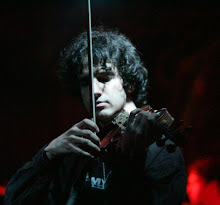
Michael Jackson, pop star, died on June 25th, aged 50
First, the songs. The light, infectious lilt of “Don’t Stop Til You Get Enough”. The sheer, vicious swoop of “Speed Demon”. The soft, syncopated sadness of “Billie Jean”, or the raucous shouts of “Bad”. His high, pure tenor was shot through with the little yips and sighs he had learnt from Diana Ross. And behind it lay the astonishing confidence of child-star Michael in “I’ll Be There” or “Rockin’ Robin”, with each note treble-true and each time-change as natural as taking breath.
Next, the dancing, springing from the music like a bird out of a trap. Pointing, jerking, thrusting, with rage in his feet, as Fred Astaire said once. He was at war with the floor as it slid away in the Moonwalk, and with the air as he spun through it. He danced with his knees, on tiptoe, hunching his shoulders to his ears. His splayed hand pulled at his crotch as if emasculation would be sweet to him.
The show was everything. Lights made a giant of him as he stood motionless: one white, glittering, gloved hand raised, fedora pulled down at a slant. Under the tight, too-short trousers, sequinned socks (“No one would recognise Bruce Springsteen by his socks”). On stage he felt truly alive, invincible, “unlimited”. He would appear in explosions of smoke and fire, or fly away like an astronaut. On his videos he was a leader of crowds, prowling the city in “Thriller” (1983) in an outfit red as blood. P.T. Barnum was his model, crossed with Walt Disney. He wanted his life to be “the greatest show on earth”. And so, for much of the 1980s and 1990s, it was, with “Thriller” the biggest-selling album ever, eight Grammys in 1983, his dark, lavish videos a staple of the fledgling MTV channel and his place as the King of Pop assured.
In Neverland
What lay behind it? He told his biographer, Randy Taraborrelli, that he had “deep, dark secrets”. They were encased in a voice as soft as a whisper, a handshake that felt like a cloud, a face as pale and delicate as plastic surgery and Porcelana skin-bleach could make it. Dark glasses and surgical masks kept the world away from him. On his estate at Neverland in southern California, remote from the “normal people” who might grab and scratch him, he lived like a child with blank-eyed mannequins, pet snakes and Ferris wheels. He shared his meals with a chimpanzee and his bed with young boys, “the most loving thing to do”. People spread rumours about him, even twice accused him of sexual abuse, but he was never proved guilty of anything: except love, and desire for lost childhood, and a longing to be Peter Pan.
But that too was a show. Behind it was a man who could not bear to hear that Elvis still surpassed him, or that Madonna had won a Grammy when he hadn’t. He could force hard deals and millions of dollars out of Motown, CBS and Sony in face-to-face confrontations; he could fire his manager and his lawyer, after years of service, without a trace of sentiment, for letting down the brand; he could beat Paul McCartney to the Beatles’ back catalogue and exploit it ruthlessly, despite their friendship. He performed for 18 years with his four elder brothers in the Jackson 5, the bouncing, grinning child from Gary, Indiana transforming into a global megastar, then left them as brutally as he had always upstaged them. But the family never left him. He blanked Joseph Jackson from his life and excised him from his face, but could not forget his father’s exhortation to be “a winner, not a loser”. Perfectionism, like distrust, had been beaten into him.
What show business required, he had also learnt, was to give the fans what they wanted. If they demanded fantasies, he would provide them. (“The longer it takes them to discover [who I am], the more famous I will be.”) From the end of the 1980s he devised ever more headline-grabbing ventures: bidding for the bones of the Elephant Man, sleeping in an oxygen chamber, appearing in toyshops and galleries in garish wigs and moustaches. Dates were arranged with Tatum O’Neal and Brooke Shields to prove he was all man, rather than the shrinking virgin of his other public self. Two marriages were undertaken, three children vicariously produced.
Oddness overshadowed his real, hard-won achievements: world adulation for a black pop star, the birth of video celebrity, and millions of dollars given to black causes. If the press stayed on his weird story, he believed, his records would sell. The risk was that the weirdness would multiply until he was hardly human.
His last public appearance, before his death of apparent cardiac arrest, was to announce a series of 50 sold-out concerts in London. Hours before his death he was rehearsing for them, exuding joy, energy and sharp judgment. His glitter jackets, the tabloids claimed later, hid a body that was half-starved, subsisting on painkillers. Though he was worth $1.3 billion, said the Sun, he died with debts of $300m.
But he had sold 750m albums and, from Riga to Rio, children danced like him. In the words of his “Dirty Diana”,
That’s OK
Hey baby do what you want
I’ll be your night lovin’ thing
I’ll be the freak you can taunt
And I don’t care what you say
I want to go too far
I’ll be your everything
If you make me a star
Jul 2nd 2009
From The Economist print edition

Nenhum comentário:
Postar um comentário